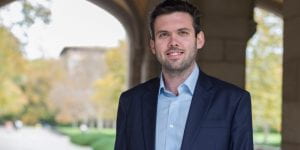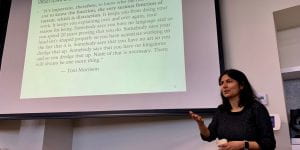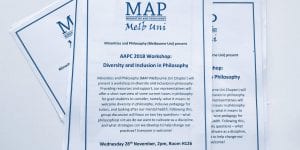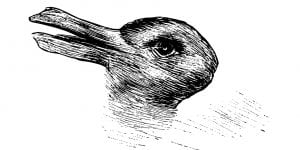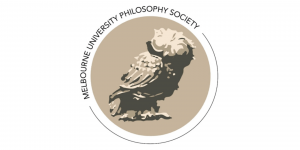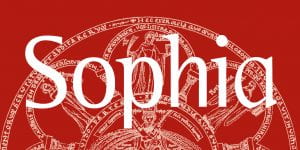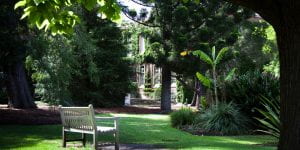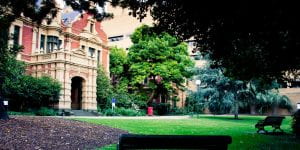Category: Philosophy
-
Lian Zhou
Lian Zhou, ‘De Se Communication: Language, Thought and Co-aboutness’ (PhD in Philosophy, 2020) This dissertation is about the co-aboutness problem of de se communication. An essential requirement of successful communication is that participants of communication must talk about the same subject matter. I call this requirement the co-aboutness condition of communication. According to the traditional […] -
Associate Professor Howard Sankey Appointed to the Académie Internationale de Philosophie des Sciences
In 2019 Associate Professor Howard Sankey was elected to the Académie Internationale de Philosophie des Sciences (AIPS) in Brussels. This election marks his recognition as one of the world’s leading philosophers of science. To celebrate this achievement, we introduce Howard Sankey’s work below, in an interview conducted by Philosophy PhD candidate Adam Govers. When did […] -
Wave as Eigenzeit: A Meditation on Medial Time
In the 2019–2020 academic year, Dang Nguyen from History and Philosophy of Science in SHAPS is spending her time in the United States as a Fox International Fellow at Yale University in New Haven, Connecticut. As Yale closed its campus, Connecticut went under lockdown, Australia closed its borders, and Vietnam called for overseas Vietnamese to […]blogs.unimelb.edu.au/shaps-research/2020/04/04/wave-as-eigenzeit
-
The Life You Can Save
Celebrating the tenth anniversary of his influential book The Life You Can Save, Professor Peter Singer discusses why we need to do more to improve the lives of people living in extreme poverty in this 2019 episode of the University of Melbourne’s Eavesdrop on Experts podcast. To listen, press play below. For the original podcast episode and […]blogs.unimelb.edu.au/shaps-research/2020/02/06/the-life-you-can-save
-
Philosophy on the Small Screen
In 2019, Senior Lecturer in Philosophy Dan Halliday teamed up with Snodger Media and the ABC to make a documentary series on practical ethics. The result was a series called Ethics Matters, which was integrated into high school curricula in Victoria and New South Wales. He speaks here with Carley Tonoli about his experience in […]blogs.unimelb.edu.au/shaps-research/2019/12/05/philosophy-on-the-small-screen
-
Constructing Social Hierarchy: Conference Recap
How do hate speech, slurs, and other speech acts contribute to and perpetuate oppression? What does it mean to be a ‘woman’ in today’s society? How do our gender concepts impact the ways in which we are able to relate to the world and those around us? How should we strike a balance between freedom […]blogs.unimelb.edu.au/shaps-research/2019/09/11/constructing-social-hierarchy
-
Meet the new Head of School, Professor Margaret Cameron
In the midst of her relocation from Canada to commence her appointment as the new Head of the School of Historical and Philosophical Studies (SHAPS), Professor Margaret Cameron took some time out to chat to SHAPS Forum’s Carley Tonoli about her love of philosophy, her academic career, and her excitement about heading up the SHAPS […] -
Meet Dr Holly Lawford-Smith: Prize-winning Author, SHAPS Philosopher, and Seamstress Extraordinaire!
On the back of her new book, Not in Their Name: Are Citizens Culpable for Their States’ Actions?, SHAPS Senior Lecturer in Political Philosophy, Dr Holly Lawford-Smith sat down for Q&A with Forum’s Carley Tonoli. What sparked your initial interest in philosophy? My initial interest in philosophy came during my undergrad. I took a course […]blogs.unimelb.edu.au/shaps-research/2019/06/04/holly-lawford-smith
-
On Language and Listening to One Another: Dr Ross Barham on the Value of Philosophy
In 2018 Ross Barham completed his Philosophy PhD, investigating the relationship between human language and the way we understand the concept of objectivity. He chatted to Carley Tonoli about how it feels to be on the other side of the finish line. -
Meet Brigid Evans, recent SHAPS Master of Arts, Philosophy graduate
In 2018 Brigid Evans completed her Masters by research in the areas of political philosophy and philosophy of education. On a recent trip home from her new base in the UK, she chatted to Carley Tonoli about reflections on her research. -
The 2018 Australian Postgraduate Philosophy Conference
Eight SHAPS graduate philosophers recently headed out to Monash to present their work at a major event for Australian philosophy postgraduates, the annual Australasian Postgraduate Philosophy Conference (APPC). -
Philosophy Thursday Seminar
The Philosophy Thursday Seminar Series features presentations by SHAPS Philosophy staff and collaborators in Melbourne, and from across Australia and the world. The range of issues covered in the seminar — from formal epistemology to the history of philosophy — reflects the variety of work done in the School. Enquiries about subscribing to the mailing […]blogs.unimelb.edu.au/shaps-research/2019/02/01/philosophy-thursday-seminar
-
Melbourne University Philosophy Society
The Melbourne University Philosophy Society (MUPS) is a student society focused on promoting and building the philosophy community at the University. We run weekly events that are open to all year levels with the aim of providing a safe and encouraging environment for people to discuss and debate the great philosophical questions. We are always […] -
Sophia
Since its founding in 1962 by Max Charlesworth and Graeme De Graaff in the then Department of Philosophy at the University of Melbourne, Sophia has provided a forum for discussions in philosophy and religion, focusing on the interstices between metaphysics and critical theological thinking. The discussions encompass the wider ambience of the sciences (‘natural’ philosophy […] -
William Barrett
William Barrett (MA in Philosophy, 2019) ‘Gambling, Rationality and Public Policy‘ Gambling involves complex social and commercial institutions and practices, large numbers of participants, and vast amounts of money. In this thesis I introduce a philosophical perspective on gambling and its regulation. I develop an account of the rationality of gambling and derive implications for […]blogs.unimelb.edu.au/shaps-research/2016/11/07/william-barrett
-
Ross Barham
‘Davidson’s Objective — Language and The Concept of Objectivity’ (PhD in Philosophy, 2018). This thesis critically examines Donald Davidson’s claim that language plays a non-trivial role in explaining possession of the concept of objectivity. After showing that a priori arguments do not establish this claim, different versions of Davidson’s triangulation argument are developed and found […]blogs.unimelb.edu.au/shaps-research/2016/11/06/ross-barham-2
-
Brigid Evans
‘Integration or Separation? Educational Justice Requirements for the Disabled’ (MA in Philosophy, 2018). In academic political philosophy, there is currently much enthusiasm surrounding the development of integration as a requirement of social justice. The application of integration to educational policy already exists but has centred on overcoming racial and/or economic segregation. Integration as a moral […] -
Nicholas Evans
‘A Revolution in Just War Theory? Expanding the Laws and Ethics of War to Cover Revolutionary Conflict’ (PhD in Philosophy, 2018). Can just war theory be extended to cover revolutionary conflict and other forms of intrastate war? In short, it can be. Yet how this might be achieved is contingent on one’s commitment to particular […]blogs.unimelb.edu.au/shaps-research/2016/11/04/nicholas-evans
-
Mohammad Mahdi Sadrforati
Mohammad Mahdi Sadrforati, ‘Conceptual Change: Rationality, Progress and Communication’ (PhD in Philosophy, 2019) Conceptual change in science first became a hot topic five decades ago, when questions were raised about rationality and progress through scientific change. The first and most well-known approach to explaining conceptual change was to explain the rationality and progress of science […] -
Ariel Kruger
‘A Principled Reason to Prefer Causal Explanation in the Sciences’ (PhD in Philosophy, 2018). Not all scientific explanations are causal; some are non-causal. Can we find any reason to prefer one over the other? If the explanations are competing to explain the same phenomenon and adjudicating between them cannot be done on empirical grounds, I […] -
Kieran McInerney
‘Reconceiving the Reasonable Probability of Success Criterion’ (PhD in Philosophy, 2019). This thesis examines the Reasonable Probability of Success criterion of jus ad bellum. Chapter One provides an initial explication of this principle. It outlines its historical origins, and explains the rationale for requiring that this criterion is satisfied in order for it to be […]blogs.unimelb.edu.au/shaps-research/2016/11/01/kieran-mcinerney
-
Daniel Nellor
‘The Mattering of Others and the Possibility of Politics’ (PhD in Philosophy, 2019). This thesis asks how our thinking about politics might be informed by a particular approach to thinking about morality. I begin by arguing that the moral mattering of others is something that is encountered in the world, and not the conclusion of […]blogs.unimelb.edu.au/shaps-research/2016/10/30/daniel-nellor
-
Salman Panahy
‘A Justification for Deduction and Its Puzzling Corollary’ (PhD in Philosophy, 2019). This thesis examines how deduction is analytic and, at the same time, informative. The first two chapters are dedicated to the justification of deduction. This justification is circular, but not trivially circular as not every rule can be justified circularly. Moreover, deductive rules […]blogs.unimelb.edu.au/shaps-research/2016/10/29/salman-panahy
-
Chad Stevenson
‘Playing the Hand You’re Dealt: Well-being and the Poker-Hand Account’ (MA in Philosophy, 2018). This thesis advances a novel theory of wellbeing called the poker-hand account. On this account, welfare is not one-dimensional (as is traditionally supposed) but two-dimensional. This bipartite model of welfare draws a distinction between how a person is ‘going’ (what states-of-affairs […]blogs.unimelb.edu.au/shaps-research/2016/10/26/chad-stevenson
-
Eva van der Brugge
‘The Use of Argument Mapping in Improving Critical Thinking’ (PhD in Philosophy, 2018). Critical thinking is not defined clearly enough to guide teachers in practice. Even within the broad definitional categories that can be discerned, individual definitions are rarely specific enough to allow for clear educational or assessment frameworks. Purpose-built critical thinking tests mostly fail […]blogs.unimelb.edu.au/shaps-research/2016/10/23/eva-van-der-brugge
-
George Wood
‘The Feeling of Metaphor’ (MA in Philosophy, 2019). There is a tendency in analytic philosophy of language to separate a metaphor’s affective powers, often identified with its ability to make us ‘see’ things in new ways, from a conception of its meaning. This is the case in the non-cognitivist denial that there is such a […]
Number of posts found: 76




